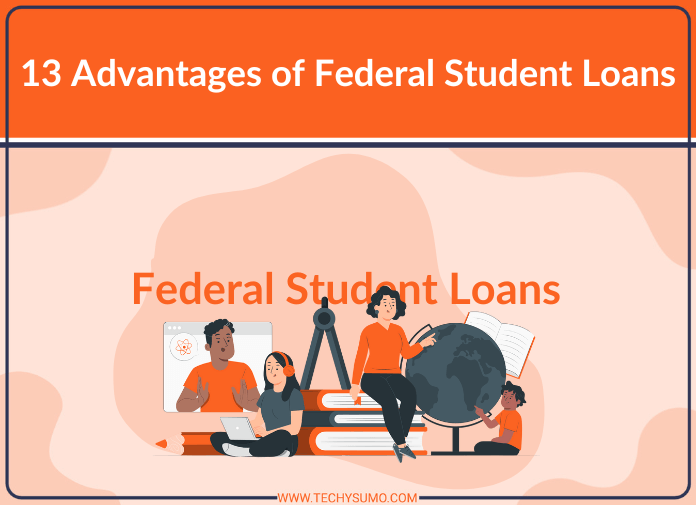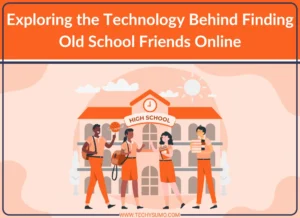
Many college students today rely on student loans to cover the cost of their education. About 65% of graduates in 2019 took out student loans. However, not all student loans are the same. Federal student loans have many benefits that make them an excellent student option. Let’s examine 13 reasons federal student loans can be an intelligent choice.
Table of Contents
- 13 Advantages of Federal Student Loans
- No Credit History Needed
- No Co-signer Needed
- Fixed Interest Rates
- Lower Interest Rates
- Interest Accrual May Begin After College
- Forbearance and Deferment Options
- A Repayment Grace Period
- Income-Driven Repayment Options
- Takes Longer to Default
- Consolidation Available with Poor Credit
- Loans Can Be Discharged
- Student Loan Forgiveness Options
- No Standard Limit on Parent Borrowing
- Learn More About Student Loans
13 Advantages of Federal Student Loans
No Credit History Needed
Unlike loans from banks or credit unions, federal student loans don’t require a credit history. You must complete the Free Application for Federal Student Aid (FAFSA). It’s much easier to qualify for a federal student loan than a private one.
No Co-signer Needed
Federal student loans don’t need a co-signer. Students can take on the responsibility without asking a family member or friend to help. Private loans often require a co-signer, especially if the student has little credit or a job.
Fixed Interest Rates
Federal student loans have fixed interest rates, which means the rate stays the same for the entire loan life. Private loans can have fixed or variable rates, but fixed rates are beneficial because they protect you from sudden increases in your monthly payments.
Lower Interest Rates
Federal student loans usually have lower interest rates than private loans. For example, for loans disbursed between July 1, 2020, and July 1, 2021, the rate was 2.75%. Private loans tend to have higher rates because they are considered riskier for lenders.
Also Read
Interest Accrual May Begin After College
For students with financial needs, subsidized federal student loans don’t accrue interest at least half-time while they are in school. The government pays the interest during this period. Private loans often don’t offer this benefit, meaning students are responsible for interest from the start.
Forbearance and Deferment Options
Federal student loans offer forbearance and deferment options, allowing you to postpone payments. You can typically get up to three years of forbearance or deferment. During deferment, the government pays the interest on subsidized loans.
A Repayment Grace Period
After leaving college or dropping below half-time enrollment, federal student loan borrowers get a six-month grace period before they have to start repaying their loans. During this time, interest accrues on unsubsidized loans, but the Department of Education pays the interest on subsidized loans.
Income-Driven Repayment Options
Federal student loans offer flexible repayment plans based on your income. Four income-driven repayment plans cap your payments at a percentage of your discretionary income, making it easier to manage your loans.
Takes Longer to Default
Federal student loans give you more time to make payments before they are considered delinquent or in default. A loan is delinquent after three missed payments (90 days past due) and in default after nine months of missed payments. Private loans typically consider a loan delinquent after just one missed payment.
Consolidation Available with Poor Credit
If you have multiple federal student loans, you can consolidate them into one direct loan with a single monthly payment. This is easier with federal loans because credit isn’t a factor for consolidation, unlike with private loans.
Loans Can Be Discharged
If the borrower dies or becomes totally and permanently disabled, federal student loans can be discharged, meaning the debt is cancelled. Some private lenders offer this protection, but it’s more familiar with federal loans.
Student Loan Forgiveness Options
Federal student loans offer forgiveness options. For example, the Public Service Loan Forgiveness program forgives loans after ten years of public service and 120 qualifying payments. Loans can also be forgiven after 20 or 25 years of income-driven repayment, though forgiven debt may be taxable.
No Standard Limit on Parent Borrowing
Parents can take out Parent PLUS loans to help pay for their child’s education without a standard borrowing limit. This means they can borrow as much as needed to cover college expenses after other financial aid is applied. However, credit checks are required for these loans.

Learn More About Student Loans
To learn more about student loans, follow the Student Loan Ranger blog for guidance on forgiveness, discharge, and payment options. Stay updated with U.S. News Education on Facebook and Twitter for the latest tips and advice on paying for college.






